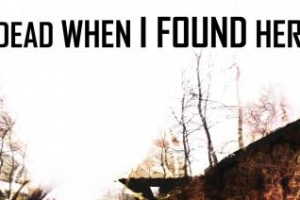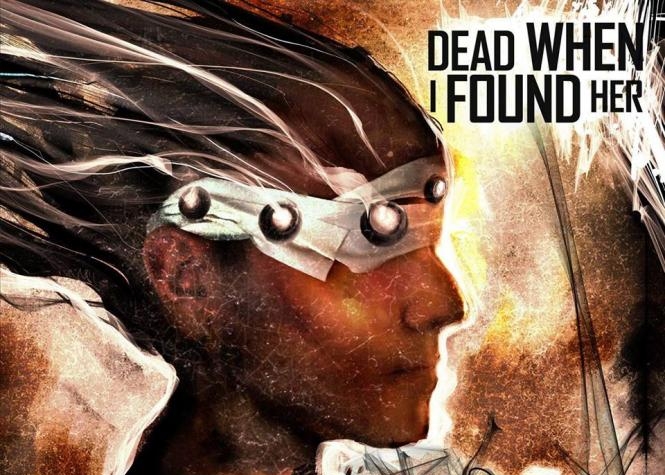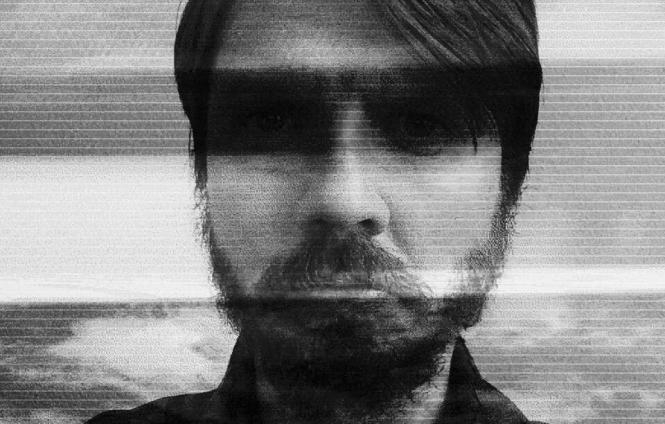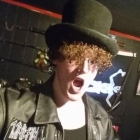
While the world moves forward there are several musicians who choose to keep their sound embedded in the analogue riddled past, and anyone who knows what's what in the industrial scene understands Michael Arthur Holloway AKA Dead When I Found Her is one such prodigy who pulls heavily from electro-industrial from the 80s and early 90s. His music has been critically acclaimed by fans and critics alike in the scene. This will no doubt remain the same as DWIFH's next album Eyes On Backwards edges towards release. It is also my pleasure to bring you this interview with Holloway from DWIFH. Below is the track 'Tantrum' which serves as a little teaser for the rest of the album, so be sure to check that out while your read all about Eyes On Backwards.
Hello Michael and welcome to Brutal Resonance! It's getting busy for you as the time for you to release your next album Eyes On Backwards draws near. How are you feeling? Excited? Nervous? A little bit of both?
Holloway: Album releases are always an exciting time, and in fact for me it’s very easy – all my hard work has already been done, so around the time of the release the guys at the label are working a lot harder than I am. Usually the albums have been done for three to six (sometimes nine!) months before their release, which means that by the time the album is in the audience’s hands, I’ve already moved on. In fact usually I’m well into production of the next release when the last one comes out.
Each of your previous albums have maintained a strict focus on late 80s and early 90s industrial and electro-industrial. With Eyes On Backwards I am – as well as I'm sure many others will – are drawing comparisons to the legendary Skinny Puppy. Did you look to Skinny Puppy as a major influence for this album? Or did it kind of just fall into place like that?
It's hard to actually pin-point my favorite part on the album thus far as it's absolutely excellent. I notice a bit of adrenaline building up every time I listen to the first two tracks 'Tantrum' and 'The Big Reverse'. Do you find it important to pull in the audience within the first couple of songs or do you think it's the whole package that counts?

From your beginnings with Harm's Way in 2010 to 2012's Rag Doll Blues and last year's All The Way Down, how has your sound changed or matured with Eyes On Backwards?
Do you feel as if Eyes On Backwards is your best work to date? Or do you feel as if each album you've created has its own time and place to stand on its own with strength?
I think Harm’s Way, from a production standpoint, isn’t as strong as the other albums, but that’s understandable to me – I was learning what I was doing while I made that album, after a long time away from music mixing and recording. Each song was a step in teaching myself how to write and record music with my new set of tools—Ableton Live, for example, was brand new to me when I started writing Harm’s Way.
Out of the nine tracks on Eyes On Backwards, which one is your favorite and why?
Are you going to be supporting this album on tour or anything of the such? Do you have a release party or any gigs going on?

And what else lies in store for the future of Dead When I Found Her? Any remixes, additional songs, or EPs in the work? Anything you can tell us about?
I never stop working on new material, though. I’ve also just launched a personal website as new business venture – www.darkestcorner.net – wherein I provide musical scores to video games and other media with a specifically ‘dark’ theme. But I still find time to work on new DWIFH material as well; my industrial energies are currently as alive as ever. Sometimes I think I’m feeling burnt-out on the music, but it never lasts more than a few days and then I’m back at it.
This is a question of curiosity, but I've always enjoyed knowing what other musicians are currently listening to. So, what bands have you been completely addicted to lately?
And that's all for now. I thank you for your time and wish you the best of luck with the new album and I also look forward to reviewing it. Cheers! The space below is yours to say what you wish!
Nov 02 2016
I wanted to create my own world ... and destroy it. I was inspired by realities of today's world.
Electric Resistance, Feb 19 2014

Steven Gullotta
info@brutalresonance.comI've been writing for Brutal Resonance since November of 2012 and now serve as the editor-in-chief. I love the dark electronic underground and usually have too much to listen to at once but I love it. I am also an editor at Aggressive Deprivation, a digital/physical magazine since March of 2016. I support the scene as much as I can from my humble laptop.
Share this interview
Facebook
Twitter
Google+
Shares
Popular interviews
Psyclon Nine
Interview, Mar 24 2017
Night Runner
Interview, Oct 13 2016
Testube
Interview, Apr 02 2022
Kite
Interview, Feb 10 2017
God Destruction
Interview, May 17 2016
Related articles
Skinny Puppy - 'The Greater Wrong of the Right'
Review, Jan 01 2004
Skinny Puppy - 'Weapon'
Review, Jun 07 2013
Skinny Puppy - 'Bootlegged, Broke and in Solvent Seas'
Review, Sep 14 2012
Dead When I Found Her - 'Rag Doll Blues'
Review, Feb 24 2013
Skinny Puppy - 'HanDover'
Review, Oct 05 2011



